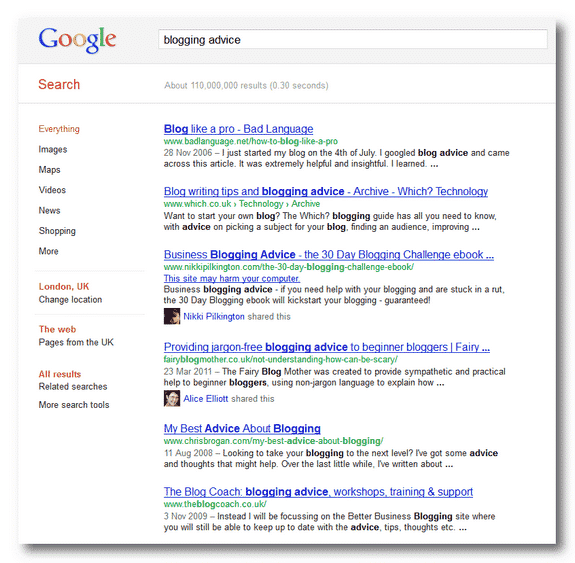Being “number one” on a Google search results page is a much-wanted position for most businesses. Indeed, it has spawned a whole new industry – search engine optimization – and has led to hundreds of books on the topic, training courses, webinars and a seemingly endless array of blogs on the subject. Experts explain that the statistics show that unless you are in the “top 3” you may as well not bother because few people venture further down the page of results and almost no-one goes on to the second page. But that is all about to change.
For a while, Google has inserted “publication dates” into the beginning of a search listing. Now, the company has announced that it has improved this system, meaning that the dates will be more accurate and that we will see more of them. This is going to have a profound effect on the way people engage with a search results page – no longer will the “number one” slot necessarily be seen as “the best” shot.
Consider a recent search for “blogging advice”. The first result on the page had no date associated with it. The second result is undated too, as is the third. But the fourth result shows 23 Mar 2011, while the fifth result is dated 11 Aug 2009. Now, if you want blogging advice what would you prefer? Advice from a web page which is relatively recent? Advice from a web page that is over two years old? Or advice from pages which could be from so far back Google can’t even find their date? The chances are for this search results page, the Number Four entry – the most recent – is the one that is going to get the biggest share of traffic.
The reason is simple – human beings want the most up-to-date information. Anything seen as old, or out-of-date, is considered as less trustworthy than the most recent information on the same subject. Our early history has programmed our brains to believe that newest is best. Our ancestors quickly learned that old food went bad and poisoned us. Only the new, fresh, stuff was life-giving. So our brains focus on “new” as being a positive attribute.
Not only is Google’s publication date system going to make us be more selective when we search, it also means a dramatic change for website owners. In order to become more visible than your competitors it means you need to be more up-to-date. Essentially, Google’s little “tweak” to its search results actually means that website owners need to update their pages much more often than ever before, simply to stay ahead of the competition. Whatever your website is about, being “Number One” on Google may not matter as much nowadays as being able to show that your website is the “newest” on the subject.
Related articles
- Google Announces “Megasitelinks,” Image Search Improvements & Better Byline Dates (searchengineland.com)
- 5 Ways to Use Google+ to Improve Your Search Engine Optimization (socialmediaexaminer.com)
- Google Updates Algorithm to Provide Fresher Results for 35% of Searches (hubspot.com)



gdsags
Our Website: ===== www fashion-long-4biz com ====
Our main product list is as follows:
Websites be updated or designed frequently, so more chance that Google crawl an updated websites.Google also consider and give positive ranking, if websites updated regularly. its an effective activity to get favorable results.